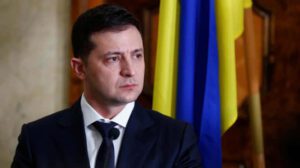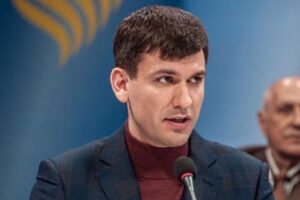
In the next video YouTube-channel of the analytical center “Club of experts” the prospects of trade and economic relations between Ukraine and Egypt were considered.
As the founder of the Club of Experts Maxim Urakin emphasized, before the war Egypt was the most favorable trade partner for Ukraine, the trade surplus with which amounted to almost 2 billion U.S. dollars. Grain and metallurgical products were the main Ukrainian goods at the Egyptian market.
At the same time, in the first months of the war, the Russian blockade of maritime communications in the Black Sea limited Ukrainian exports to Africa and, above all, to Egypt. The grain agreement improved the situation, but only with regard to agricultural exports. In order not to lose the Egyptian market, the Ukrainian companies have to adapt to the current situation now in order not to make additional efforts after the war.
According to the President of the Ukrainian Exporters Club Eugenia Litvinova, the Ukrainian producers should pay attention to the Egyptian market of dairy products in the first place. In this case, it is necessary to take into account the separation of Egyptian groups of goods for wholesale and retail trade while creating favorable conditions for imports. Also, according to her, the demand in Egypt is for canned and dried fruits, confectionery, chocolate, oils, fats, mineral water, as well as crockery, various cutlery, baths, showers, sinks, building materials and other goods for the retail trade.
“I want to draw attention to the fact that all Ukrainian exporters who want to trade with Egypt, must be registered in the general administration to control exports and imports. After that it is possible to establish logistics through rail and road ways, taking into account the temporary inaccessibility of the port of Odessa”, – she explained.
Besides, Yevgeniya Litvinova noticed that since March of the last year, Egypt obliged Ukraine to use the letter of credit for many groups of goods that leads to rise in price of transactions from 0,2 to 0,5%. This factor, according to the expert, will also directly affect trade and its final results.
“If we talk about advice to our small and medium-sized businesses when entering the Egyptian market, first you need to understand what exports are, if you have not previously been involved in this process. Then you should analyze in which cases it is profitable to open a Ukrainian enterprise in Egypt to work, and in which cases you do not always need to do it and not always profitable. Finally, the third tip – go through the registration. At least look at how to pass authorization, registration through a single window in Egypt. I draw your attention to the fact that your brand should be registered at least in Ukraine before you start to pass this registration in Egypt, “- summed up Eugenia.
In turn, the head of the Egyptian diaspora in Ukraine, Dr. Atia Walid noticed that in recent years Egyptian-Ukrainian trade relations have been intensively developed and our country has been invited to participate in major infrastructure projects, which are now being implemented by the Egyptian authorities.
“Back in 2021 Egypt discussed with the Ukrainian government investment in the special economic zone of the Suez Canal. That is, the Egyptian economic policy is primarily aimed at encouraging investment in the country’s economy. Egypt, of course, is interested in cooperation with Ukrainian companies from the point of view of opening joint ventures on its territory, which can well be realized today, despite the war. I think it is quite realistic for Ukrainian companies to open branches there, if they are interested in the sales market. Egypt is ready to facilitate this,” stressed the representative of Egypt.
In his opinion, our suppliers should work more actively both with the Egyptian embassy in Kiev and the Ukrainian embassy in Cairo. This will facilitate the passage of bureaucratic procedures and reduce the likelihood of becoming victims of fraud.
“Ukrainian businessmen should check with the Egyptian embassy or the Chamber of Commerce the authenticity of the documents of those organizations with which they cooperate. And only after that, conclude a contract according to all international rules. You should not believe the promises and pretty eyes, and do not forget the basics of doing business in the field of export-import. I wish all businessmen in Egypt and in Ukraine only success,” said Dr. Atia Walid.
See more details in the video:
You can subscribe to the Club of Experts channel by following the link:
ATIA_VALID, BUSINESS, CLUB_EXPERTS, CLUB_EXPORTERS, EGYPT, EXPORT, GOODS, IMPORT, LITVINOVA, TRADE, UKRAINE, URAKIN

Ukrainian business paid 80 billion UAH more in taxes in 2022 than in peaceful 2021, Prime Minister Denis Shmygal said.
“Despite continued hostilities and enemy attacks, we will do everything possible to make 2023 the first step for a great recovery of the Ukrainian economy. In 2022, we did the impossible and financed absolutely all budget expenditures. In total, these expenditures amounted to about 2.7 trillion UAH,” Shmygal said at a government meeting on Friday.
According to him, Ukrainian citizens and businesses last year paid more than 900 billion UAH to the state budget, another 425 billion UAH were paid to the Pension Fund and social insurance funds.
“Due to the issue of military bonds, about 600 billion UAH were received. We are grateful to the citizens and businesses who bought these bonds and thus invested in a strong army and a stable state,” the prime minister added.
Shmygal thanked Ukrainian businesses, which paid 80 billion more in taxes in 2022 than in 2021.
“Your steadfastness, patriotism, adaptability and social responsibility allowed to keep the economy of Ukraine afloat. 2023 should be the year of our victory and the year of the beginning of the recovery of our economy. We work together for this,” he concluded.

Ukrainian President Vladimir Zelensky has called on French business to invest in the Ukrainian food industry.
Speaking by video link at the “Solidarity with the Ukrainian People” conference in Paris on Tuesday, Zelensky recalled that this year “through joint efforts we managed to stop the unfolding of the global food crisis.”
“We have already exported more than 13 million tons of grain. Thanks to our Grain from Ukraine initiative, we will help the poorest countries,” he said.
“But we also send humanitarian cargo to export, mostly raw materials, and we can send processed products. Right now there is a need to build a whole industry that will be export-oriented and definitely have consumers, and definitely give profit,” Zelensky said.
It would be right, he said, “if French business has already assessed the prospects and came to Ukraine. The same is in the energy, machine building, defense industry, transport and other industries.

The Kyiv analytical center “Club of Experts” together with the consulting company “Club of Exporters of Ukraine” and the information portal Open4business launched a new project to help Ukrainian businesses achieve success in international markets.
According to the founders of the project, at the first stage, a series of video courses will be created on the YouTube platform, with the help of which it will be possible to get acquainted with the peculiarities of doing business in the EU countries, importing and exporting goods, European certification rules, etc.
“Thanks to our project, businesses will be able to receive prompt advice and assistance from our representatives both in Europe and in Ukraine,” said Maxim Urakin, founder of the Club of Experts.
According to Evgenia Litvinova, CEO of the Ukrainian Exporters Club, the business project will include not only a series of training videos, but also the possibility of providing specialized advice to those companies that want to quickly and cost-effectively enter the European and global markets.
“For each consulting assignment of our client, we carefully select a project team, which is formed from internal and external experts who are specialists in the required industries. The presence of good contacts and reputation within the country, both in industries and with various government agencies, allows us to quickly and efficiently implement projects,” Litvinova said.
For individual advice on doing business in the EU and other countries of the world, you can fill out the online form at the link:
https://docs.google.com/forms/d/e/1FAIpQLSeit-dG6SJ9E9QtDSZ4ggqQEmn1RHyAMKfDqO90Db4cDn1ZEA/viewform
Project partners:
Exporters Club: https://people2people.com.ua/ru/
Portal Open4business: https://open4business.com.ua
Expert club channel: https://www.youtube.com/@user-nz9lh8yg9g
BUSINESS, BUSINESS_IN_EU, CLUB_EXPERTS, CLUB_EXPORTERS, HELP_BUSINESS, URAKIN, ЛИТВИНОВА

The Cabinet of Ministers has launched three new grant programs to support businesses, Prime Minister of Ukraine Denys Shmygal said.
“The first is irrevocable grants for the creation and development of processing enterprises. This may be an enterprise in the woodworking, metalworking, agricultural processing, furniture or construction sectors,” he said during a government meeting on Friday.
He added that the state will provide up to UAH 8 million in grant funds for those who already own a processing business or want to start one. It is fashionable to spend the grant on the purchase of equipment, the main requirement is to create at least 25 new jobs. In this case, the business owner must invest 30% of his investment. To receive a grant, an entrepreneur should submit a working idea, the prime minister explained.
The Cabinet of Ministers also approved a grant program for the IT sector and high-tech startups in the amount of UAH 750 thousand to UAH 3.5 million with the requirement to create at least five jobs.
In addition, the government launched the Start in IT grant program for IT education with a budget of UAH 1.8 billion, Shmygal noted. Thus, the state plans to finance educational grants up to UAH 30,000 for 60,000 Ukrainians. Funds can be spent on paying for a school or courses that will be determined by the Ministry of Finance.
This program is not for students or current professionals, but for those who have lost their jobs or are down and want to learn new skills in the profession of a developer or web designer, he pointed out.
Gradually, the details of these and other programs within the framework of the eWork project will become available in DIA, the head of government said.

Businesses should talk not only about compensation for the damage caused to them due to the Russian aggression, but also about compensation for all the damage caused, Hennadiy Borysychev, founder of the Konkor law firm, has said.
“Please note that damage is only part of such a concept as harm, in particular, harm caused by Russian aggression. Damage includes not only direct losses, but also additional costs, lost profits, and there is also moral damage. For example, for legal person it is real to prove the existence of moral damage caused, in particular, due to the loss of non-property assets, goodwill and others,” he told Interfax-Ukraine.
The lawyer said that for each of these types of damage there are specific features of recording – the collection of evidence about the existence of the fact of damage and its size. At the same time, it is important to clearly establish all types of damage caused and prove both the very fact of the existence of damage and its size.
“It is important to consider and prove all components of the damage caused in a complex, that is, in interconnection. It is a mistake to break down the recording and assessment of the amount of damage for separate objects of one business that suffered damage, since a business (enterprise) is a property complex, and includes both property, and non-property assets,” he said.
Borysychev drew attention to the fact that when assessing the damage, it is necessary to follow the government resolution No. 326 dated March 20, which sets the procedure for determining the damage and damage caused to Ukraine as a result of the armed aggression of the Russian Federation.
The lawyer said that in the near future it is expected to adopt an appropriate methodology for assessing harm and approving acts for recording it.
In addition, Borysychev pointed out the need for a correct legal qualification of the actions that caused damage, which will affect the prospects for compensation.
“War is not an “event” like a natural disaster or accident, and not a private conflict, as a result of which harm is caused. Harm caused to a business is exactly the type of harm that refers to such grave consequences of war, which in turn entitles a business to receive the status of a victim. That is, the application of such a legal approach allows us to involve the law enforcement agencies of the state in recording the damage. This method of recording the damage when assessing evidence both in Ukraine and in foreign jurisdictions will have certain advantages and allows attracting the state to the side of the victim,” the lawyer said.
Borysychev drew attention to the fact that the problem of compensation for damages caused by Russian aggression is not a common well-established practice for law firms. At the same time, an important point is the lack of a mechanism for enforcing decisions on claims for damages against the Russian Federation.
“This problem is extraordinary and has not yet been solved anywhere in the world, it requires the development of law enforcement practice. Ukrainian courts have positive experience in claims against the Russian Federation, there is positive experience in arbitration, but an important nuance has not yet been taken into account – the mechanism for executing such decisions,” he said.
Borysychev said that earlier the Konkor law firm won the right to the status of a victim due to Russian aggression several years before the start of the second hot stage of the war on February 24.
“Now our solutions and experience in this area have become relevant and unprecedented,” he said.
The lawyer said that among foreign jurisdictions, the most promising for the restoration of the violated rights of war victims are the jurisdictions of the UK, the United States and Canada.
He said that the law firm will focus on the development and implementation of the legal mechanism in Ukrainian courts.
Borysychev said that at present, the current issues are the adoption of a law on compensation for damage to victims of Russian aggression in Ukraine and the creation of a common accessible mechanism for all categories of victims in Ukraine to obtain the status of victims and compensation for damage.